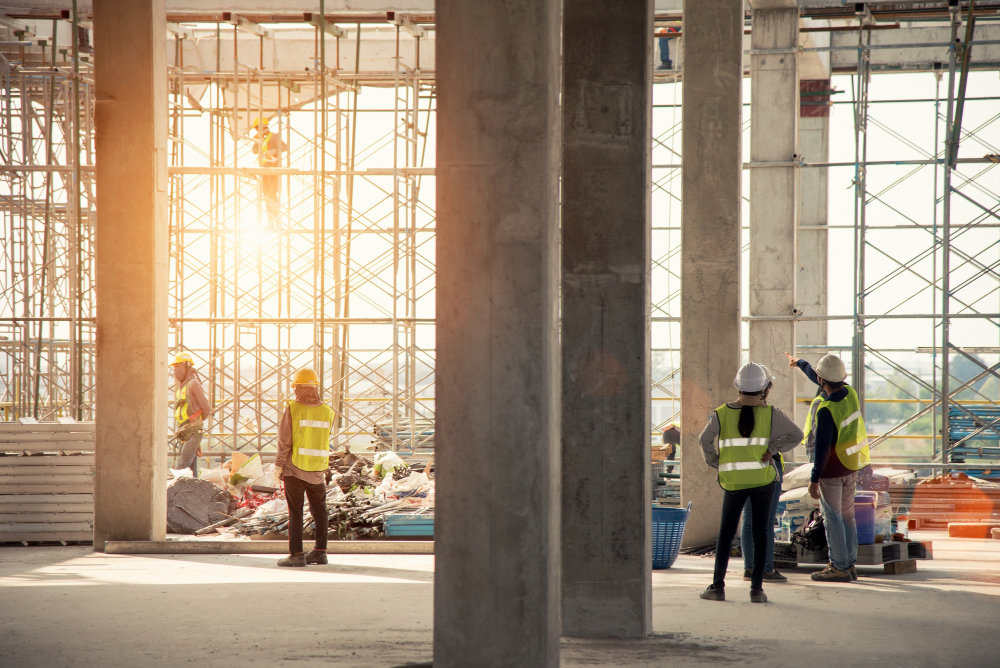Last updated on
Embarking on a commercial construction project is a significant undertaking that requires meticulous planning and thoughtful consideration of various factors. Whether you are constructing a new office building, retail space, or an industrial facility, the success of your project hinges on careful planning and execution.
From budgeting to choosing the right construction team, each decision plays a crucial role in determining the project’s outcome. In this article, we will explore key considerations that should be at the forefront of your mind when planning a commercial construction project, ensuring that you navigate the complexities of the process successfully.
What's Inside
Comprehensive Budgeting

One of the foundational elements of any successful commercial construction project is a comprehensive and realistic budget. Without a clear understanding of the financial requirements, projects can quickly spiral out of control, leading to delays, cost overruns, and potential setbacks.
Begin by conducting a thorough cost analysis that includes all aspects of the project, such as materials, labor, permits, and unforeseen contingencies. Engage with experienced construction estimators and financial experts to ensure that your budget is not only accurate but also accounts for potential fluctuations in the market or unexpected expenses.
Beyond the initial budgeting phase, it’s crucial to implement robust financial controls throughout the construction process. Regularly review and update your budget as the project progresses, identifying any deviations and addressing them promptly.
Effective budget management requires collaboration and communication between all stakeholders, including architects, contractors, and project managers. By prioritizing a realistic budget and maintaining financial transparency, you set the stage for a successful commercial construction project that stays on track and delivers value for your investment.
Selecting the Right Team

The success of a commercial construction project is heavily dependent on the expertise and collaboration of the construction team. Choosing the right professionals, from architects and engineers to contractors and subcontractors, is a critical decision that can significantly impact the project’s outcome.
Take the time to thoroughly vet potential team members, considering their experience, track record, and compatibility with the project’s scope and requirements. A collaborative and skilled team can streamline the construction process, reduce the likelihood of errors, and contribute to the overall success of the project.
Clear communication and a shared vision are key components of a successful construction team. Establishing open lines of communication from the outset fosters a collaborative environment where challenges are addressed promptly, and decisions are made collectively.
Regular team meetings, progress updates, and a commitment to problem-solving contribute to a positive working relationship among all stakeholders. The synergy of a well-chosen and coordinated team is a crucial factor in the timely and efficient completion of a commercial construction project.
Regulatory Compliance and Risk Management

Navigating the complex landscape of regulatory compliance is a fundamental aspect of planning a commercial construction project. Failing to adhere to local building codes, zoning regulations, and environmental requirements can lead to costly delays and legal complications.
Before breaking ground, conduct a thorough review of all applicable regulations and engage with local authorities to ensure that your project is in full compliance. This includes obtaining all necessary permits and approvals, addressing environmental impact considerations, and ensuring that the project aligns with community standards.
Additionally, robust risk management strategies are essential to anticipate and mitigate potential challenges throughout the construction process. Identify potential risks, both internal and external, and develop contingency plans to address them proactively.
This may include weather-related delays, supply chain disruptions, or unexpected site conditions. By integrating risk management into the project planning phase, you enhance your ability to navigate unforeseen challenges, minimize disruptions, and maintain the overall progress and quality of the construction project.
Professional Commercial Construction

Engaging with experienced commercial developers is a strategic move that can elevate the success of your construction project. Collaborating with professionals who specialize in commercial development brings a wealth of industry knowledge and expertise to the table.
These developers have a deep understanding of the unique challenges and requirements associated with commercial projects, from navigating zoning laws to optimizing space for business operations. By involving commercial developers early in the planning phase, you tap into their insights to refine your project’s design and ensure it aligns seamlessly with the demands of the market.
Their expertise can prove invaluable in optimizing layouts, enhancing functionality, and incorporating elements that contribute to the long-term success and appeal of your commercial property. Moreover, commercial developers often have established networks with reliable contractors and can assist in assembling a skilled and coordinated construction team, streamlining the overall project execution.
Sustainable Construction Practices
Sustainability is a crucial consideration in commercial construction projects. Embracing sustainable practices not only aligns with environmental consciousness but also offers long-term benefits, including cost savings and enhanced market appeal.
Incorporate eco-friendly materials, energy-efficient systems, and green building standards into your project to minimize its environmental impact. Collaborate with architects and construction teams well-versed in sustainable practices to ensure that your commercial construction project meets or exceeds industry-recognized green building certifications.
This commitment to sustainability not only reflects positively on your corporate responsibility but also positions your commercial property as an attractive and forward-thinking investment.
Technology Integration for Efficiency
The integration of cutting-edge technology is a game-changer in commercial construction projects. Leverage Building Information Modeling (BIM), project management software, and other advanced technologies to enhance collaboration, streamline workflows, and improve overall project efficiency.
BIM, in particular, allows for detailed 3D modeling and simulation, providing a comprehensive view of the project before construction begins. This not only aids in identifying potential issues but also allows for better decision-making throughout the construction process.
Embracing technology can also contribute to better communication between stakeholders, real-time project tracking, and improved overall project transparency. By staying at the forefront of technological advancements, your commercial construction project gains a competitive edge in terms of efficiency, accuracy, and the successful delivery of a high-quality final product.
Embarking on a commercial construction project is a multifaceted endeavor that demands careful consideration of various factors. From comprehensive budgeting to selecting the right team, navigating regulatory compliance, engaging with professional developers, prioritizing sustainability, and integrating cutting-edge technology, each element plays a pivotal role in the success of your project.
By addressing these considerations with diligence and strategic planning, you not only mitigate potential risks but also set the stage for a seamless and successful commercial construction journey.
Whether you are constructing an office building, retail space, or an industrial facility, the interconnectedness of these aspects ensures a holistic approach that maximizes efficiency, minimizes risks and delivers a commercial property poised for long-term success in the market.




